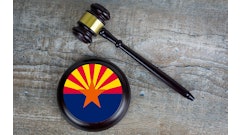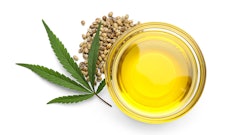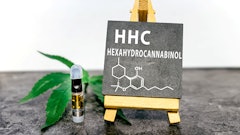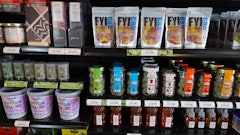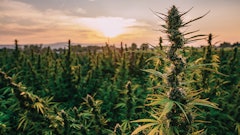
A California federal appeals court ruled last month that delta-8 THC is legal under the 2018 Farm Bill.
Is this much-needed clarity to help the industry make sense of federal policy governing the compound, which many have argued is legal since it is derived from federally legal hemp?
Shawn Hauser, partner at Vicente Sederberg and co-chair of the firm’s Hemp and Cannabinoids Department, and Jason Evans, co-founder and co-owner of Tweedle Farms, a cannabinoid hemp farm in Jewell, Ore., said it will likely be business as usual after the ruling.
The opinion from the 9th Circuit Court of Appeals stems from a trademark dispute brought by AK Futures, which manufactures vaping and e-cigarette products, according to a Forbes report.
In its lawsuit, the company alleged that Los Angeles-based Boyd Street Distro sold counterfeit versions of AK’s delta-8 THC products, the news outlet reported. In its defense, Boyd Street claimed that AK’s trademark infringement allegations were invalid because delta-8 remains illegal under federal law.
The 9th Circuit upheld a lower court ruling and a preliminary injunction against Boyd Street in its opinion that products made with delta-8 are legal under federal law, which defines hemp as “any part of” the cannabis plant, including “all derivatives, extracts, [and] cannabinoids,” as long as they contain no more than 0.3% delta-9 THC by weight, Forbes reported.
In short, the court ruled that AK’s delta-8 products are legal under the 2018 Farm Bill and that they may receive trademark protection, according to the news outlet.
The panel of judges said that federal law “is silent with regard to delta-8 THC” and that “regardless of the wisdom of legalizing delta-8 THC products, this Court will not substitute its own policy judgement for that of Congress,” according to Forbes.
The 9th Circuit ruling stated that if Congress did not intend to legalize psychoactive cannabinoids, including delta-8, when it legalized hemp through the 2018 Farm Bill, then it is up to Congress to close the loophole in the law, Forbes reported.
“It is significant, given that hemp is only recently legal,” Hauser said. “There’s very limited court precedent on interpreting the legality in the Farm Bill.”
Hauser added that while businesses that produce and sell delta-8 products may rely on this ruling to support the federal legality of these products, it is important to note that to be fully federally legal, a product must also comply with the Federal Food, Drug, and Cosmetic (FD&C) Act, and the 9th Circuit’s ruling does not address this issue.
That means those who choose to produce and sell delta-8 products are still operating under the risk of FD&C Act enforcement and the potential for different interpretations of the legality of delta-8, Hauser said.
“This will give them some comfort, at least from the derivative perspective, [that] the delta-8 ingredient … is legal under the Farm Bill, and it’s the legality of the finished products under [FD&C Act] and state law that may be more difficult for folks to justify legality on,” she added.
The U.S. Food and Drug Administration (FDA) is ultimately responsible for enforcing the FD&C Act, and, with limited resources, Hauser said the agency will likely continue to go after only the most egregious violations.
The FDA issued its first batch of warning letters to delta-8 companies May 4, when it warned four businesses that they were marketing their products in violation of the FD&C Act.
Hauser said it is significant that the 9th Circuit ruling emphasized the fact that the Farm Bill most likely did not intend to legalize intoxicating cannabinoids that have similar effects to delta-9 THC and that Congress must now step in to address the loopholes in the law that have allowed delta-8 products to flourish.
“I think that emphasizes the need for our full Congress to address this issue, and we’re coming up on the 2023 Farm Bill, where it’s possible that this may be addressed,” she said. “There are also bills in Congress that would regulate hemp-derived consumable products, where it could be addressed, as well. So, it really underscores the need for congressional action to align the law with congressional intent.”
Until Congress acts, the responsibility of ensuring that delta-8 products are regulated and safe to consume falls on the states, Hauser added.
States that have adopted regulations to ban or regulate delta-8 within their borders still have the authority to enforce those rules, she said, and she expects to see an increase in state regulation moving forward.
“Businesses still, to be legal, have to comply with applicable state laws, which can be prohibitive or restrictive regarding delta-8 and other intoxicating cannabinoids,” she said. “They also have to comply with state and federal food and drug laws. So, this isn’t a full blessing of federal legal authority. The [FD&C Act] still applies, and it’s possible other circuits could change the outcome. But I think the status quo will stay the same for delta-8.”
Evans, whose business produces and sells hemp and nonintoxicating hemp-derived products like topicals and edibles, agreed that the industry will likely remain unchanged after this ruling and urged companies to follow “the spirit” rather than “the letter” of the law when it comes to the 2018 Farm Bill and hemp.
“Once you get a judge sitting in a black robe saying, ‘Oh, it’s legal,’ people are going to trot that out as further evidence, when everyone knows they’re just driving truckloads of cash through a loophole with poorly written legislation,” Evans said. “The problem that I have with it, as a hemp farmer, is that the program was created, if not by letter, but by spirit, to parse out the intoxicating nature versus the nonintoxicating, commodity nature of this plant. Marijuana has been grown and intended to intoxicate. Hemp, when they parsed it out legally, was supposed to be grown … for its fiber, for its nonintoxicating properties, including CBD. And by way of loophole, the system is being subverted.”
Evans argued that delta-8 could still be considered illegal under the Federal Analogue Act, which allows any chemical similar to a Schedule I or Schedule II substance to be treated as a Schedule I drug under federal law.
Evans ultimately advised businesses looking to enter the hemp industry to “do what you should do, not what you can do” until federal policy catches up and there is a framework in place to ensure safe, tested delta-8 products for consumers.
“It needs to be safety tested and regulated and taxed,” he said. “And until and unless we get there, you’re going to see these bad actors continue to see short-term gains without any regard to the public safety or long-term health of the industry."

















